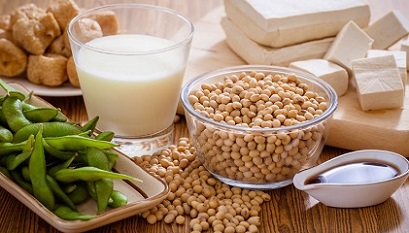Herbs And Phytochemicals: Daidzein And Genistein From Soyabeans And Equol, A Gut Flora Metabolite From Daidzein Can Help In Prostate Cancer
Nikhil Prasad Fact checked by:Thailand Medical News Team Nov 26, 2023 2 years, 2 months, 4 weeks, 19 hours, 9 minutes ago
Herbs And Phytochemicals: Prostate cancer (PCa) stands as a formidable global health challenge, exhibiting significant variations in incidence and mortality rates across different regions. Notably, East Asia reports lower PCa incidence compared to Western countries, a phenomenon often attributed to dietary disparities.

Emerging evidence from epidemiological studies suggests an intriguing inverse relationship between soy isoflavone intake and PCa risk, sparking interest in the potential chemopreventive role of soy-derived compounds. This in-depth
Herbs And Phytochemicals article delves into the cellular effects of soy isoflavones, with a specific focus on genistein, daidzein, and equol, aiming to elucidate their therapeutic implications in prostate cancer treatment.
Soy Isoflavones: Genistein, Daidzein, and Equol
Soybeans, a staple in many diets, emerge as a rich source of the phytochemicals called isoflavones, including genistein and daidzein. When soybeans undergo fermentation, isoflavone aglucon is produced, revealing genistein, daidzein, and glycitein as prominent components. While glycitein has demonstrated beneficial effects, including in gastrointestinal and breast cancers, this study review zeroes in on the more extensively studied daidzein and genistein. It is noteworthy that only daidzein undergoes gut flora metabolism to produce equol, a metabolite distinguished by unique chemical characteristics and heightened antioxidant activity.
Cellular Effects of Genistein, Daidzein, and Equol
-Modification of Androgen- and/or Estrogen-Mediated Carcinogenesis: Genistein and equol, structurally resembling estrogen, engage in competitive binding with estrogen receptors (ER). ER-β, predominantly found in the prostate, plays a pivotal role, with both isoflavones influencing androgen receptor (AR) activation. This interplay results in reduced prostate-specific antigen (PSA) levels, emphasizing the anti-androgenic effects of these compounds.
-Inhibition of Cancer Cell Growth:
Genistein's multifaceted impact on cell growth includes the inhibition of growth factor tyrosine kinase (TK) activity, especially at higher doses, and interference with epidermal growth factor receptor (EGFR) and ErbB receptors. These actions contribute to its anti-proliferative effects. Moreover, genistein's modulation of insulin-like growth factor 1 (IGF-1)-stimulated cell growth and induction of apoptotic cell death through various pathways underscore its potential in inhibiting cancer cell growth.
-Effects on Cell Cycle Regulation:
Genistein's ability to arrest the cell cycle at G2/M phase, upregulate cyclin-dependent kinase (CDK) inhibitors, and induce apoptosis underscores its regulatory role in cell cycle progression. Both equol and daidzein exhibit similar effects on cell cycle regulation, further emphasizing their potential as agents targeting aberrant cell growth.
-Angiogenesis:
The inhibition of angiogenesis, a critical proces
s for tumor growth, by isoflavones involves the suppression of vascular endothelial growth factor (VEGF) and other pro-angiogenic factors. This anti-angiogenic effect further supports the potential of soy isoflavones in impeding cancer progression.
-Tumor Cell Invasion and Cancer Metastasis:
Genistein's inhibition of matrix metalloproteinases (MMPs), enzymes crucial for metastasis, and its impact on various proteins associated with metastatic processes underscore its potential to curb cancer invasion and metastasis. Equol and daidzein exhibit similar inhibitory effects on MMPs.
-Antioxidant and Anti-Inflammatory Effects:
Soy isoflavones, particularly equol, exhibit robust antioxidant properties by modulating cellular enzyme expression, protecting against free radicals and reactive oxygen species (ROS). Moreover, genistein's anti-inflammatory effects are demonstrated through the reduction of tumor-associated macrophages (TAMs) and the inhibition of inflammatory mediators.
-Epigenetic Regulation: Genistein's influence on DNA methylation and histone modifications, along with its regulation of microRNAs, suggests a role in epigenetic control. This epigenetic influence extends to key tumor suppressor genes, further emphasizing the potential of soy isoflavones in altering gene expression patterns associated with cancer.
Clinical Implications and Ongoing Research
While the preclinical studies, both in vitro and in vivo, demonstrate promising inhibitory effects of soy isoflavones on various pathways implicated in prostate cancer, the translation of these findings into clinical practice requires rigorous investigation. Clinical trials are essential to validate the chemopreventive potential of genistein, daidzein, and equol in prostate cancer. Factors influencing bioavailability need careful consideration in the design of these trials.
The role of soy isoflavones in cancer prevention and treatment is a topic of active research. Clinical trials are exploring the efficacy of soy isoflavones in reducing PCa risk, influencing tumor progression, and enhancing the effectiveness of conventional treatments. Moreover, ongoing studies are delving into the interplay between soy isoflavones and genetic factors, aiming to personalize therapeutic approaches based on individual patient profiles.
Conclusion
In conclusion, the comprehensive exploration of soy isoflavones - genistein, daidzein, and equol - reveals a myriad of cellular effects that hold substantial promise in the realm of prostate cancer. While in vitro and in vivo preclinical data provide intriguing insights into the biological inhibitory influences of these compounds on carcinogenic and metastatic pathways, the journey from bench to bedside requires further validation through well-designed clinical trials. As research continues, soy isoflavones emerge as potential adjunctive agents in prostate cancer prevention and treatment, offering a natural and potentially effective approach to combat this prevalent malignancy. The nuanced understanding of the molecular mechanisms underlying their effects opens avenues for targeted and personalized therapeutic interventions, bringing us one step closer to harnessing the full therapeutic potential of soy isoflavones in the fight against prostate cancer.
The study review by researchers from University Hospital Brussels-Belgium and the University Hospitals Leuven-Belgium was published in the peer reviewed journal: Nutrients.
https://www.mdpi.com/2072-6643/15/23/4856
For the latest on
Herbs and Phytochemicals, keep on logging to Thailand Medical News.
